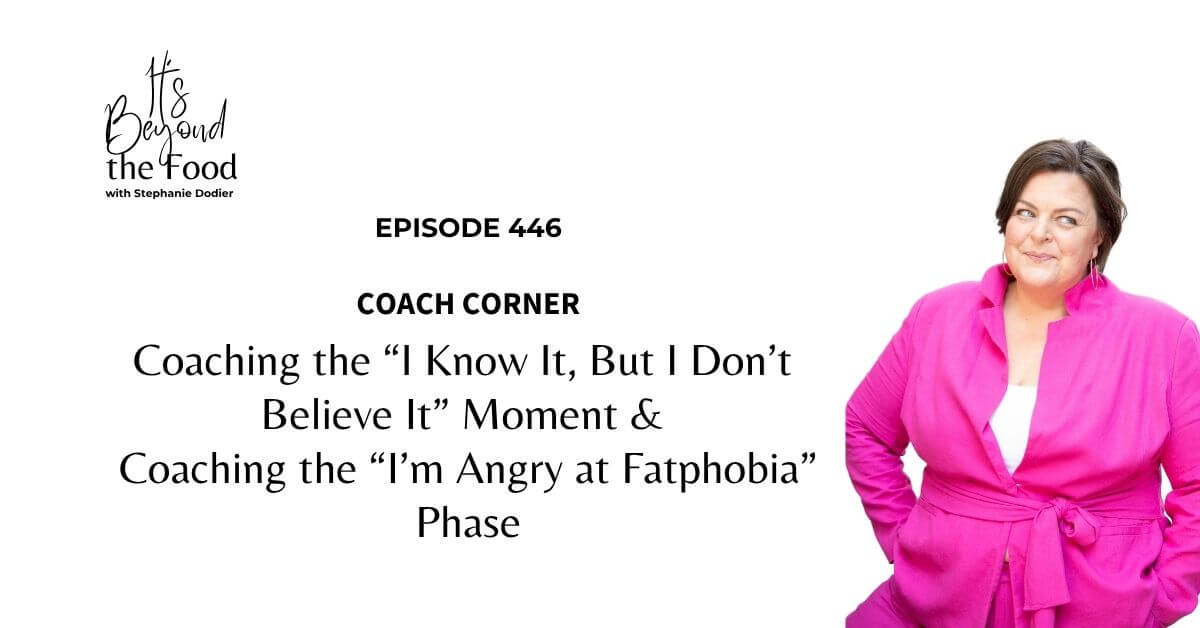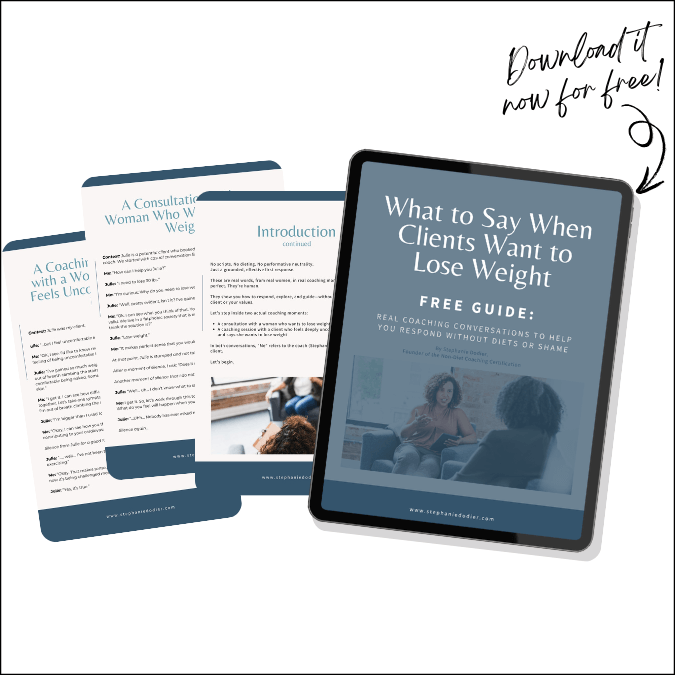

In this episode of It’s Beyond the Food Podcast, I’m answering two powerful coaching questions that come straight from our community. These questions dive deep into the emotional and psychological side of coaching—where belief meets behavior change. If you’ve ever had a client say, “I know it, but I don’t believe it,” or felt unsure how to navigate a client’s anger during body neutrality coaching, this episode is for you.
We break down how belief grows in stages and how to support clients at each one. You’ll learn how to help them move from just knowing a concept to actually embodying it. We also talk about the anger that often comes with unlearning fatphobia and how to coach through it without trying to fix or avoid it. This is a real, raw look at the work we do as coaches—and how to do it with more confidence and clarity.
Episode Highlights & Timeline
[0:43] – A sneak peek into the Coach Corner Vault and how to access it.
[1:00] – Why “I know it, but don’t believe it” is actually a good sign.
[2:19] – The three stages of building belief: wanting, possibility, and probability.
[4:00] – How belief is both cognitive and somatic, and why that matters.
[5:00] – How thought laddering supports body neutrality coaching.
[6:14] – Why taking action is critical to building belief, not just thinking positive thoughts.
[7:32] – Coaching a client who feels angry during the unlearning process.
[9:26] – How the five stages of grief apply to body image healing.
[10:21] – Why women are taught to avoid anger and how to coach through that.
[12:36] – Teaching clients to feel, validate, and channel anger into action.
[14:08] – A reminder that anger is a milestone, not a setback.
Mentioned in the show:
Non-Diet Coaching Certification Waitlist
What To Say When Clients Want To Lose Weight Guide
Full Episode Transcript
This transcript was auto-generated and lightly edited for clarity.
Click to expand the full transcript
How can coaches help clients move from intellectual understanding to embodied belief in body neutrality?
Coaches can help clients move from intellectual understanding to embodied belief in body neutrality by guiding them through a step-by-step process that includes:
Thought laddering: Introduce gradually believable thoughts that bridge the gap between where they are and where they want to be.
Somatic practices: Encourage clients to feel safe in their bodies through nervous system regulation and mindful embodiment exercises.
Repetition and action: Help clients take aligned actions that reinforce the new belief and build real-life evidence.
Emotional processing: Support clients in feeling and validating emotions like anger, grief, or resistance without judgment.
Client-led reflection: Use open-ended questions to help clients notice shifts and name progress in their journey.
This blend of cognitive and body-based strategies creates the foundation for sustainable change in body neutrality coaching.
[00:00:00] Welcome to It’s Beyond the Food Podcast, my sister. I’m your host Stephanie Dodier, and in today’s episode, we’re answering two powerful coaching question. One is about how to help your client increase the level of belief, and the other one is how to coach the anger phase of undieting your life. Now before we dive in, if you love the short podcast episode that teach you very specific coaching technique, you want to go and grab the Coach Corner vault, which is my library of over 50 mini training on mindset, body image, eating behavior, and even some for you as a business owner.
[00:00:43] You can go in a show note around this podcast episode in your app or stephaniedodier.com/coach-corner.
[00:00:51] You ready? Let’s dive in. Our first question is to help you when you’re facing this situation. I [00:01:00] know it, but I don’t believe it and I’m gonna answer it in the context of body image, because that’s our specialty, and that’s typically where that comes up.
[00:01:11] However, it can also comes up into eating behavior coaching, specifically when we’re removing the food restriction, or even in health promoting behavior. When we’re helping our clients see that they can engage in health behavior without having to lose weight. Irrelevant of the situation. This concept will be applicable.
[00:01:35] And I’m just gonna give you a side note since I was just talking about business coaching. It’s also applicable for you in the pursuit of your goal in your business when you’re thinking I know that it’s possible for me to make X amount of money, but I just don’t believe it. That will apply to you as well.
[00:01:53] So first of all let’s normalize this. I know it, but I don’t believe it. It’s actually a good [00:02:00] sign. It’s a good sign because the first stage of increasing your belief has been passed. So let’s talk about these three stages of increasing your level of belief. Stage number one is wanting to believe something new.
[00:02:19] It’s going through the process of learning about a new belief, understanding the new belief, and then making the decision of wanting to integrate this new belief. That’s stage one. Stage two is what I call possibility. Meaning that you understand it from stage one, now you’re like seeing it possible in other people, very relevant to body image.
[00:02:45] Your clients will say like, I can see it, that other people can be neutral to their body. I believe that maybe it’s possible for me, but like far, far, far in the future and I’m likely [00:03:00] going to have to struggle to get there. Stage two possibility.
[00:03:05] Stage three is when the client is actually engaged into belief building process where the probability of them believing is happening. I believe I will be neutral with my body. I can see steps in my life that it’s actually happening. I can see myself through. If I continue to do what my coach tell me to do, I will. I will increase my belief with time. So three stages of increasing a belief, wanting to believe something new, possibility and probability.
[00:03:43] So when you hear, I know it, but I just don’t believe it. That’s stage one. That is a good sign. Now, how do we help people move from one stage to another? We have to take in consideration that believing something is [00:04:00] not just a cognitive process, but it’s also a somatic process. We need to integrate disbelief in our body through our nervous system, and the best way to do that is through a process called habitation, where we habituate our nervous system to something new.
[00:04:20] It’s the same process we use in eating behavior when we’re making peace with food. The same type of process will apply in believing something new, and the way we teach it in the non diet coaching certification is through something called thought laddering. Thought laddering will bring in new belief into the brain and it will help you increase that belief.
[00:04:47] So we use like prompts of an example. I’m gonna use the body image belief, my body is a tool to experience life. So when we start at the beginning of the process, we [00:05:00] say something like, it’s possible for other women to believe that their body is a tool to experience life. So I’m seeing the belief outside of myself and I’m acknowledging that it’s actually possible for other people.
[00:05:16] And then we go through the process of learning to believe that, right? So we could say something like. It’s possible for me in the far future to believe that my body is a tool for me to experience life next stage. I’m learning to believe that my body is a tool to experience life. I am believing that my body is a tool to experience my life,
[00:05:39] that would be the latter stage, the probability stage. So that’s the cognitive process. Now how do we bring that into the body? How do we integrate that is to actually taking action. And that’s the missing loop from all the positive thinking, affirmation work, [00:06:00] and I know I’m using a cocky voice here, but you could probably tell that that’s not what we teach anyway in the non diet coaching certification, positive thinking or affirmation because it’s missing the somatic component, which is actually to take action.
[00:06:14] So it’s not just thought laddering, it’s thought laddering and every step we take a bigger and a bigger action towards embodying this new belief. And we keep looking for evidence that it’s actually working for us. So taking action and looking for evidence. At the end of the day, belief is a muscle. You as the coach, need to understand the process and you need to move your client through the process.
[00:06:43] Teach them the different techniques so they can build up their belief, and it is rooted in repetition, taking action, feeling safe, and repeating that over and over again until we actually get to [00:07:00] that level of belief. So if I was to give you a takeaway for that question, belief is not something that we learn it’s something that we embody. Question number two is to help you coaching a client through the anger phase of fat phobia. And it’s actually a health coach who submitted this question, and it was because she got feedback from a client. And I’m gonna use a client’s word here, and she didn’t know what to do with this.
[00:07:32] The client said to her, the process of working with you got me really angry, and I don’t like it. I’m angry that I have to suffer because we live in a fat phobic society and I don’t know what to do with this. So the first thing I wanna say is, anger is normal, but I wanna coach the coach behind this question.
[00:07:57] That is just a thought that a [00:08:00] client is giving you. It’s giving you the thought. The process of working with you got me hangry and I don’t like it. It doesn’t mean anything about you as a coach. And this is really important, although I’m not gonna address this in this question, your level of confidence and self-esteem as a coach, like your level of believing in yourself as a coach will dictate your ability to handle that question.
[00:08:28] ’cause if your client project the thought to you and you’re grabbing that thought as an evidence that you’re not good enough as a coach, that’s not a client thing. That is a you thing that we need to coach. We need to coach you in handling your client thought, not as a sign of your competency and evidence as a coach, but simply as a thought that creates a cognitive behavior model for them.
[00:08:56] Maybe I should do an episode on that later. Let me know if you think I [00:09:00] should do an episode on that. And I’ll do that. But let’s go back to a client. So one thing to understand is the grieving process. So in psychological research as a five step process of grieving, that is what’s considered the gold standard of helping people through grieving, and I’m gonna outline it here in case you’re new to that.
[00:09:26] First stage is denial. Second stage is anger. Third stage is bargaining, fourth depression, and then fifth the acceptance level. So when a client says to you, I’m angry. I am angry and I’m feeling anger. That’s great. That means they’re on stage two of their grieving, of their understanding of who they are in their body, in society, in a western civilized society that’s anchored in diet culture.
[00:09:56] They’re grieving their old understanding, their whole belief, [00:10:00] their old way of relating to food and their body and health, and they’re in stage two. That’s great. That mean that they’re gonna move in at some point to stage three. So now I wanna bring in some feminist coaching principle because that’s how I coach and that’s how I train professional to coach.
[00:10:21] Our culture, our socialization as women tells us that we need to turn the anger inward, because we need to be quote nice. We need to be accommodating, we need to be grateful. And that’s what this client was saying. I don’t like to be angry. I don’t like that. This coaching thing makes me angry, and it’s probably because of how they’re socialized to anger.
[00:10:49] This is where you need to take your coaching. Tell me more. Why is it that you don’t want to feel anger? Why is it that you don’t like [00:11:00] to be angry right now? What is that bringing up? What does that mean about you? So we need to use the Socratic questioning, the motivational interview, although I prefer Socratic questioning to unpack what it means about them and why is it that they don’t want to be angry.
[00:11:18] And part of that is bringing in that socialization of how women are taught to relate to anger. That’s why I call that feminist coaching principle because most people will skip over that. ’cause they won’t realize that women have been socialized very specifically with anger. And that’s why they don’t want to be angry.
[00:11:40] And I think part of it is the reason why so many people, not our client, but the people who are on their own out there are stuck is because they don’t wanna be angry. Women don’t wanna be angry, and they don’t know how to move through that.
[00:11:56] So let’s talk about how, once we understand [00:12:00] why we’re angry, once we understand what we’re grieving, once we understand why as women, we don’t want to be angry, And we broaden in that feminist coaching principle, what do we do with the anger? So, emotional processing or emotional intelligence is key in that piece. We teach a principle called Riding the Wave, where we help our client through a six step process. Actually feel the emotion, locate it in the body, name it, but also understanding why it’s there, because that’s the end stage of processing an emotion.
[00:12:36] So to simplify the process for you here, we need to help our client feel the anger. Locate label that feeling in their body. Don’t deny it. Don’t numb it. Actually hold it. Describe it and feel it to validate it. And this is where understanding the grieving process and understanding how we’re [00:13:00] socialized as women towards angle comes in.
[00:13:01] So validate my relationship to anger. Why I don’t wanna feel it, why do I feel it? And then three. Channel it, right? Use it for something productive towards your goal.
[00:13:16] The key thing I want you to take away from this is that, number one, it’s normal to be angry. It’s part of the grieving process, and your role as a coach is not about fixing the anger. It’s about helping your clients step into it and feel it. Feel it and then use it as something productive towards their goal.
[00:13:43] And that, again, through a conversational style of coaching, what good can come out of this anger that you’re feeling right now once you’ve helped them feel it, what good can come out? How can that help you perhaps even [00:14:00] motivate you towards taking the action to actually realize your goal that we have in our coaching relationship together?
[00:14:08] So anger as part of the process of unlearning diet culture is totally normal. It’s not a setback. It’s actually, I like to think of it as a milestone.
[00:14:18] If this is the kind of coaching you want to master a coaching that’s rooted in behavioral change, self-trust, and a weight neutral approach to help, that’s exactly what we do inside of the non diet coaching certification. You can learn more at stephaniedodier.com/certification and that’s also where you can join the wait list for the next cohort. The next one as I’m recording this is in January, 2026, and if not, you’ll find out as you join the wait list, we’ll send you an email with the details. Until next time, my sister, I love you now. See you in the next podcast episode.
[00:14:59] wanna coach [00:15:00] behaviors, not bodies. Learn the mindset tool and the method that create real changes.
[00:15:06] Join the wait list for the next cohort of the non diet coaching certification at stephaniedodier.com/waitlist. That’s where the real training begins, and I’ll see you on the other side, my sisters.







